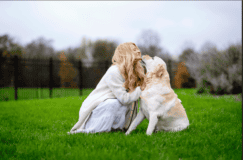Aggression in Labradors?
OK, so you probably laughed out loud while reading the title of this, didn’t you?? I know, aggression is NOT typically found in this breed. In fact, I hear most people say their labs would be the easiest dog to steal because they would be friendly even to a stranger (of course we wish we could teach them “Stranger Danger!” like we do children!) But from time to time I have heard cases from people reaching out to me for help, saying their lab is aggressive.
Right away I like to clarify, are we talking about actual aggression? Or testy puppy behavior? Let me explain…
I’ve heard someone say their puppy was aggressive because they were biting. Let’s all recognize that this is VERY typical puppy behavior. Puppies play bite with their litter mates, and will then transfer this behavior to their new human family because it’s what they’re used to. [ilink url=”https://emlabradors.com/2013/02/how-do-i-get-my-puppy-to-stop-biting/”]How to Stop Puppy Play Biting[/ilink]
Puppies also go through, what I like to call, an adolescent stage (usually beginning around 12 weeks). And just like a teenager, they have decided not to listen to a word you say and talk back. I know you’re laughing now because you know exactly what I’m talking about! Suddenly the pup gets mouthy and decides to maybe growl or bark in protest at you in that tiny little voice of theirs, after you tell them to do something. This kind of behavior has also often been enforced while they were even younger. This is why it’s all the more important to be very diligent in your training right from the get-go.
If the above scenarios do not fit your situation, here are some of the first things I would consider if you find yourself with a lab or canine that you fear is showing aggressive behavior:
- The first thing I would want to know is if she/he is spayed/neutered yet?
- Are there other pets in the house that are of the same sex?
- Has anything “socially” changed in your household? Remember, anything stressful for you can be stressful for your dog as well. They can sense our anxiety and emotions and it affects them too!
- Is she/he in pain?
- Have you had the vet examine him/her?
- Is he/she up to date on their vaccinations/de-wormings/rabies/Lyme’s vaccine?
- Does he/she feel threatened in any way? I once knew a woman who’s dog became fearful and defensive around men. After asking some more questions, I found out that her husband had some anger issues. Whether the dog was being physically harmed or not, the dog could sense the tension in the home, specifically around this man.
- Has he/she ever been alone with small children (unattended?) Small children can inadvertently HURT dogs and make them not like kids if they are left to do this. Never allow children to pull on, bully, hit, or poke at a dog! It will “sour” them on children for good if this behavior goes on too long. Teach children to respect animals, and punish them in the same way you would if they hit, hurt, or abused another child/person. (I one time pulled on my daughters ears after I found her pulling on one of my dogs ears…it was a quick, effective lesson, and it never happened again!!)
If you cover all these issues and still need a good trainer, I’d go that route. If not, I would contact Lab Rescue, as they have people who are ready to deal with dogs that have “challenges”… I’ve heard that merely moving a dog to another family or environment immediately solves the issue.










15 Comments